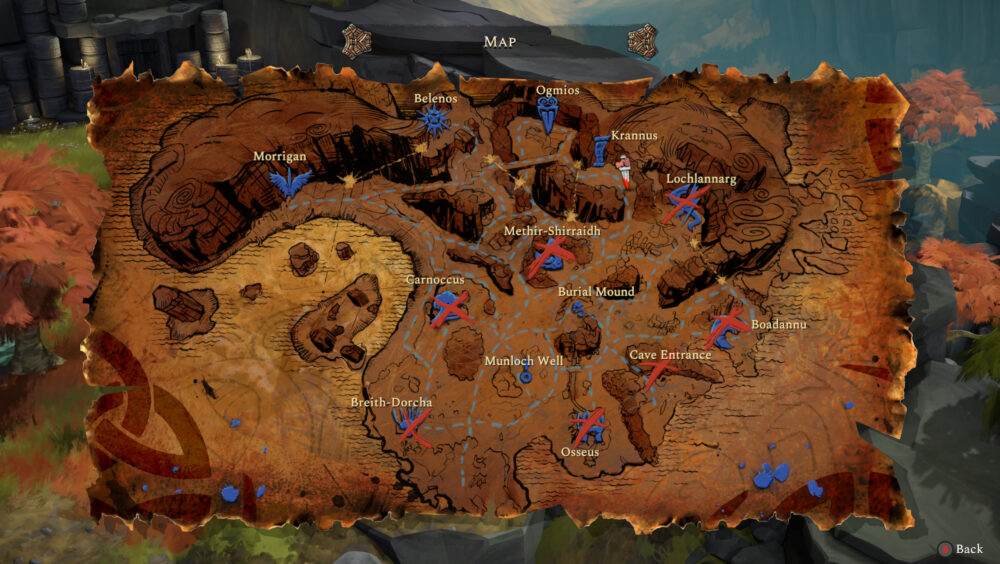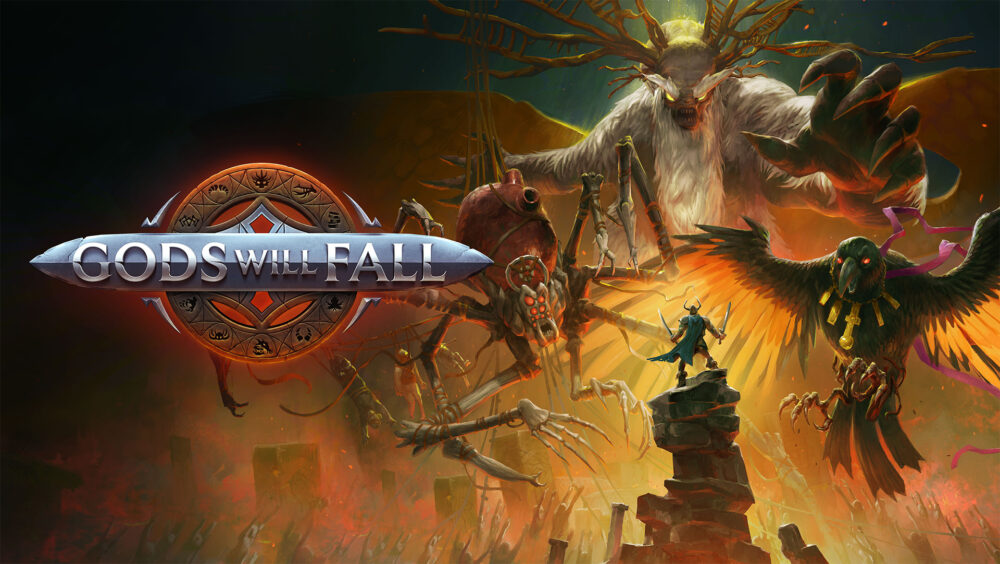Gods Will Fall is a great concept with variable execution. The premise – as told through a lengthy opening cutscene – is simple: a handful of Celt-inspired warriors survive a journey to the island of the gods, intent on destroying them and their followers, to free man from their rule. These gods – once the benefactors of mankind – have turned increasingly malevolent in their demands, pushing humanity to rebellion.
The player, after completing a simple tutorial that’ll get you accustomed to the basic mechanics, is given free rein to traverse the island’s surface, tackling dungeons in any order, and – if you keep your eyes open – discover a few secrets that will provide the party with improved gear. The narrative – at least between the opening and closing cutscenes – utilises narration and a novel dynamic system that ties into the gameplay.

Despite their apparent size, most dungeons are linear gauntlets. Several offer a degree of verticality that, when coupled with the wonky physics, is more terrifying than any enemy.
Gods Will Fall is an isometric hack-and-slash with several roguelike elements. You’re tasked with traversing a dungeon, cutting down the followers of each god as you go, before finally defeating them in an arena at the end. How the combat plays out varies based on which hero you pick to enter the dungeon (going in as a group is, apparently, dishonourable): large characters move slowly but might have more vigor (health), small characters can dash between enemies more effectively, while your weapon choice affects the damage, speed, and range of your attacks. Your abilities are further supplemented by consumables you can find, which offer various healing effects or player buffs.
When Gods Will Fall is at its best, you’ll move swiftly through each gauntlet, dodging and parrying attacks, before downing enemies with a flurry of strikes. Picking up enemy weapons – which have limited use – feels essential, as they allow you to change up your attack patterns on the fly, or can be thrown to inflict serious damage and briefly stun enemies. If you successfully land several hits, dodge blows, or get your parry timing right, you generate “bloodlust”. This mechanic feels similar to the “Rally” ability in Bloodborne, encouraging the player to be aggressive, even when low on health. Once you have accumulated several segments of bloodlust, you can let out a roar, knocking back enemies and restoring a portion of your vigor.
 will
will
The ability to tackle dungeons in order would make more sense if you could flee with your hero, even if that meant taking a stat penalty. Instead, every time you quit out, you abandon a hero until you can complete it later.
The gods themselves are a mixed bag – all inspired by Celtic mythology – but few are as intimidating as they first seem. They all have a myriad of attacks that evolve as they lose more health, they can summon mobs, or alter the arena as you fight (introducing hazards you need to avoid). A handful allows you to fight them (almost) immediately, without first exploring the dungeon to weaken them. Unfortunately, most gods can simply be tanked if you preserve your vigor, stock up a few consumables, and remember to use your bloodlust timorously. If not for several achievements that challenged me to meet optional conditions, the bulk of these encounters would have been incredibly boring.
The rogue-lite elements and adaptive story mechanics are intertwined. If a hero falls in a dungeon, they are trapped until another hero survives the gauntlet and defeats the god. To facilitate this, the dynamic narrative system often creates a bond between two characters (e.g. defining them as lovers or old friends), boosting the vigor and/or strength of that hero, giving them a better chance at surviving another run. This system also applies to heroes who complete dungeons, giving them and their companions a stat boost, new trait, or new gear. Repeatedly failing a run can result in negative traits and stat penalties that make subsequent runs tougher still. This is a double-edged sword, as several poor runs can leave your surviving heroes disparaged, with depressed stats, whereas back-to-back successful runs can make subsequent dungeons feel like a cakewalk.

You’ll find the odd note while exploring each dungeon, giving either some background on the god or hinting at their weakness.
Unfortunately – and somewhat dependant on the dungeon – Gods Will Fall rarely plays as well as it sounds on paper. The first major issue is wonky physics, which makes any battle on a moving platform, near edges, or around environmental objects a nightmare. There is no preservation of momentum, so jumping or dodging on a moving platform is often suicide. The game has barriers to stop you from falling off narrow paths and certain ledges (which counts as an instant death), but this is inconstantly applied. Several dungeons and god arenas are littered with detritus, which can stop you in your tracks, leave you unable to jump over it, flailing away at a target you just can’t reach.
The second major issue, going hand in hand with the first, is inconsistent hit detection. Enemies in Gods Will Fall have an upright and downed state – which require different attacks to hit – but also invincibility frames during certain animations. As a consequence, you’ll find yourself swinging and missing what looks like a solid hit, often enough to become frustrated. As a bonus, missing a blow and following through with the animation often sends you past the target, right into a group of enemies, or off a ledge. Both issues led to several deaths and repeat runs, which then only served to highlight that most dungeons are linear slogs, with only the enemy placement changing slightly between runs.

Defeating Breith-Dorcha would have felt far more satisfying if it required more than chugging back a few consumables and wailing away with my basic attack.
The last thing to touch on is the presentation. Sure, it looks like a Unity engine game, but the god designs, and their themed dungeons, are often striking. Frequent narration, coupled with the guttural roars, cheers, and animations of your tiny heroes, does a great job of expressing their jubilation, despair and rage. The soundtrack is a highlight, especially during boss encounters, but the actual sounds of battle are subdued and underwhelming. The performance was solid on an Xbox Series S console, so Gods Will Fall is unlikely to tax modern PC configuration or the premium consoles.
Overall, Gods Will Fall managed to simultaneously impress me and disappoint me the longer I played. When the combat clicks, your attacks land true, and the physics system doesn’t result in unfair deaths, Gods Will Fall is a lot of fun and, given you can complete a single run ion 5-6 hours, it moves so fast you’ll rarely be bored. On the other hand, several bad runs, triggered primarily by buggy deaths, will put you on the back foot, have you repeating dungeons, and serve to highlight the weakest elements of the game.
Gods will Fall is Published by Deep Silver and Developed Clever Beans
Gods will Fall is available on the following Platforms Nintendo Switch, PlayStation 4, Xbox One, Google Stadia, PC, Xbox Series X and Series S
You can purchase our reviewed version of the game which was Xbox here for £19.99.
Enjoy the review? want to read more of our reviews? then click right here to be whisked away to the realm of our opinions.








You must be logged in to post a comment.